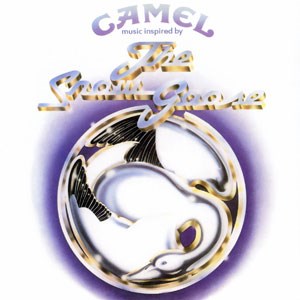
BY HASAN MURAT SÜMER (EE/IV)
hasan.sumer@ug.bilkent.edu.tr
The very best movies are created by adapting books for the cinema. That is probably not the case for rock music, but still, significant examples of inspiration from literary works exist. Ankara looks the most beautiful when it’s covered in snow, so I’ll start with “The Snow Goose.”
Camel’s fully instrumental album, “The Snow Goose” (1975), had to be retitled “Music Inspired by The Snow Goose” after threat of a lawsuit. After their first attempt to base a song on a work of literature was a big success [“Nimrodel” from “Mirage” (1974) is based on “The Lord of the Rings”], it probably seemed to the band that basing an entire album on a book would be the most logical thing to do next. So the inspiration for their next work came from Paul Gallico’s novella of that title. The resulting release turned out to be different from what the band had originally intended, because Gallico did not allow lyrics based on his text to be used on the album. I think this restriction actually worked for the better. Instead of producing an album with narrative lyrics relating the events of the story, the band, in collaboration with the  London Symphony Orchestra, created a series of short- to medium-length instrumental tracks that harmonize well into one continuous suite. The album is Camel’s most classically influenced work, and it follows the book’s story by reflecting its events in the moods induced by the tracks. After a brief intro, the album picks up speed with “Rhayader,” which introduces the character of that name and is especially memorable for its joyful flute melody. The next track, “Rhayader Goes to Town,” sets out more melodies that serves as themes for the story, and includes the best guitar solo Andy Latimer ever delivered; this has to be heard by every lover of rock music. The album goes on to introduce other characters, and themes like love and friendship, before reaching the climax of the story with “Dunkirk,” which also has beautiful guitar work and an experimental touch to it. The album finishes after the story’s concluding events, with the track “La Princesse Perdue” summarizing the music overall. “The Snow Goose” is considered a masterpiece of instrumental prog, and was so hugely successful it even raised the profile of the book.
London Symphony Orchestra, created a series of short- to medium-length instrumental tracks that harmonize well into one continuous suite. The album is Camel’s most classically influenced work, and it follows the book’s story by reflecting its events in the moods induced by the tracks. After a brief intro, the album picks up speed with “Rhayader,” which introduces the character of that name and is especially memorable for its joyful flute melody. The next track, “Rhayader Goes to Town,” sets out more melodies that serves as themes for the story, and includes the best guitar solo Andy Latimer ever delivered; this has to be heard by every lover of rock music. The album goes on to introduce other characters, and themes like love and friendship, before reaching the climax of the story with “Dunkirk,” which also has beautiful guitar work and an experimental touch to it. The album finishes after the story’s concluding events, with the track “La Princesse Perdue” summarizing the music overall. “The Snow Goose” is considered a masterpiece of instrumental prog, and was so hugely successful it even raised the profile of the book.
The Metallica song “One” is one of the finest examples of adapting literature to create music. It was especially appropriate for this band to have created this particular adaptation, because the heavy metal genre is probably the musical form most suited to describing the horrors of war. Dalton Trumbo’s antiwar novel “Johnny Got His Gun” reflects the brutal reality of war so harshly, penetrating the reader’s heart, that it actually made me cry at points. The story is especially unique, for it tells about war as seen through the eyes (though the character has no eyes) of a wounded soldier. Metallica took  advantage of this premise to write a great set of lyrics that summarize all the important aspects of the story, while sounding really good. The imagery is also embedded in the music, since the latter occasionally switches from its predominantly dark character to short, happy-sounding melodies in order to describe the character’s constant drifting between his fantasy world and the tragic reality. The book’s film adaptation was used in the song’s music video, and Metallica became even more associated with the story after buying the rights to the film (so they wouldn’t have to continually pay royalty fees).
advantage of this premise to write a great set of lyrics that summarize all the important aspects of the story, while sounding really good. The imagery is also embedded in the music, since the latter occasionally switches from its predominantly dark character to short, happy-sounding melodies in order to describe the character’s constant drifting between his fantasy world and the tragic reality. The book’s film adaptation was used in the song’s music video, and Metallica became even more associated with the story after buying the rights to the film (so they wouldn’t have to continually pay royalty fees).
The early Marillion epic “Grendel” (1982), which exceeds 17 minutes, is based on John Gardner’s novel (1971) of the same name. Here, we listen to the early English epic “Beowulf” retold from the viewpoint of its antagonist, Grendel. The best thing about this track is how amazing the guitar work is throughout its entire duration. Steve Rothery gets to deliver two of his best guitar solos here: one in the middle, where Grendel is evoking terror in people’s hearts; and one at the end, after Grendel’s slaughter. The other instrumental contributions are also truly great, and all this, combined with Fish’s committed narration, ensures that “Grendel” is early Marillion’s magnum opus, and one of the greatest epics ever told.
